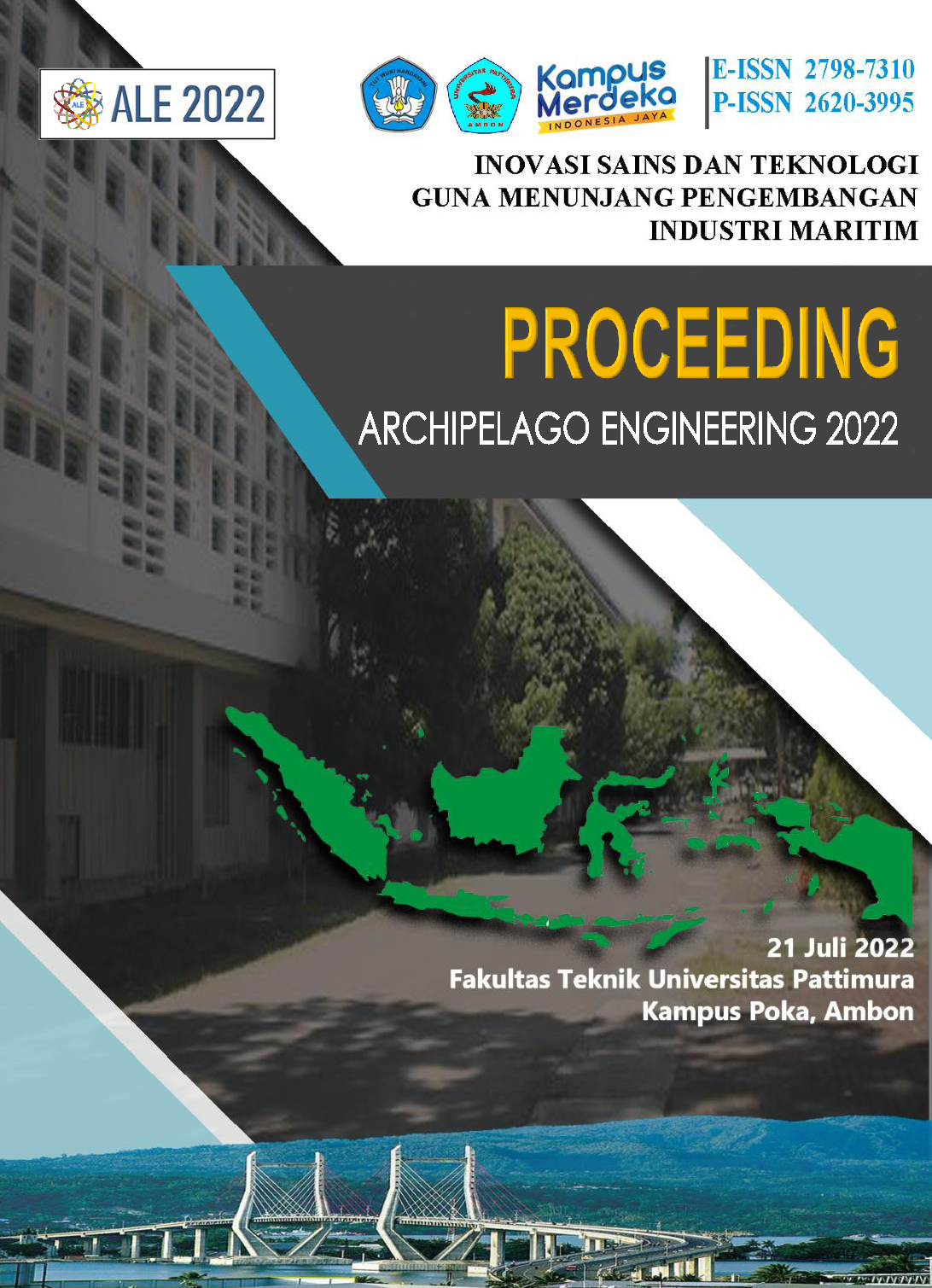ANALISIS LAJU PENGAUSAN PERLINDUNGAN ZINK ANODA PADA KAPAL TERHADAP LAJU KOROSI
Abstract
Korosi pada kapal merupakan salah satu masalah penting. Laju pengausan zink anoda adalah salah satu masalah yang ditinjau karena berhubungan langsung dengan efisiensi kerja dari zink anoda yang dapat mereduksi laju korosi. Tujuan penelitian ini untuk menganalisis seberapa besar laju korosi yang terjadi dengan membandingkan laju pengausan zink anoda terpasang pada kapal dan hasil perhitungan secara teoritis sehingga dapat diketahui perubahan laju korosi yang diakibatkannya. Data laju pengausan zink anoda terpasang diambil dari data 3 kapal dalam 5 tahun terakhir. Selain itu diperlukan data zink anoda setiap tahun. Hasil penelitian ini, pada kapal ke-1 laju pengausan cenderung tetap sebesar 19 m3.10-3 terjadi penurunan laju korosi mencapai 0,0317 mm/tahun pada tahun ke-5. Pada kapal ke-2 dan pada tahun ke 5 naik menjadi 0,0735 mm/tahun. Pada kapal ke-3 laju pengausan cenderung tetap hingga tahun ke-3 sebesar 22,23 m3.10-3 dan naik pada tahun ke-4 dan ke-5 hingga 23,27 m3.10-3 terjadi penurunan laju korosi mencapai 0,0388 mm/tahun pada tahun ke-5.
Downloads
References
Gurrappa, I., Yashwanth, I.V.S. & Mounika, I. Cathodic Protection Technology for Protection of Naval Structures Against Corrosion. Proc. Natl. Acad. Sci., India, Sect. A Phys. Sci. 85, 1–18 (2015). https://doi.org/10.1007/s40010-014-0182-0
Kusumaningrum I. and Usman M., IOP Conference Series: Materials Science and Engineering The Effect of More Anodic Metals from Zinc Addition on Cathodic Protection of Iron with Zinc as Sacrificial AnodeAgaints Corrosion Rate, 494, https://iopscience.iop.org/article/10.1088/1757-899X/494/1/012086#references, (2019)
Chao W., George W., Marcus C., David L. O. and Stephen L.., Handbook of Environmental Degradation of Materials (Third Edition) Corrosion Protection of Ships pp. 533-557, https://doi.org/10.1016/B978-0-323-52472-8.00026-5, (2018)
Class Guideline DNVGL-CG-0288, Corrosion Protection of Ships, Edition May 2017.
Lekatompessy, S. Analisis Pengendalian Korosi Pada Permukaan Basah Kapal-Kapal Baja Dengan Menggunakan Zink Anoda. Seminar Nasional Archipelago Engineering (ALE) Ke-4 2021, North America, jun. 2021. Available at: <https://ocs.unpatti.ac.id/index.php?conference=ale2021&schedConf=ale2021&page=paper&op=view&path%5B%5D=18>.Date accessed: 08 Aug. 2022.
Cleophas A L, Roland T L, and Abimbola P. P. (2019). Chemical Data Collection Performance Evaluation of Zinc Anodes for Cathodic Protection of Mild Steel Corrosion in HCL, 24, https://doi.org/10.1016/j.cdc.2019.100280
Komalasari, Komalasari & Evelyn, Evelyn & Situmeang, I & Heltina, Desi.(2020) Cathodic protection on stuctures of carbon steel using sacrificial anode methode for corrosion control. https://iopscience.iop.org/article/10.1088/1757-899X/845/1/012015
Sonja T. A. L. and Richard L.(2021). AIP Conference Proceedings 2360, Analysis of the Effect of Protection System Installation Cathode and Sacrificial Anode (Zn) on Corrosion Rate of Steel Vessels,
https://doi.org/10.1063/5.0059554
Ngatmin, Ngatmin & Purwanto, Helmy & Riwayati, Indah. (2019). Analisis Laju Korosi Pada Plat Baja Lambung Kapal dengan Umpan Anoda Korban Aluminium. Jurnal Ilmiah Momentum. 15. 10.36499/jim.v15i2.3085. DOI:10.36499/jim.v15i2.3085
Trethewey, K. R. Korosi untuk Mahasiswa dan Rekayasawan. Penerbit PT Gramedia Pustaka Utama, Jakarta 1993.
Copyright (c) 2022 Sonja Treisje Anthonia Lekatompessy

This work is licensed under a Creative Commons Attribution-ShareAlike 4.0 International License.
An author who publishes in the ALE Proceeding agrees to the following terms:
- Author retains the copyright and grants ALE Proceeding the right of first publication of the work simultaneously licensed under the Creative Commons Attribution-ShareAlike 4.0 License that allows others to share the work with an acknowledgment of the work's authorship and initial publication in this journal.
- Author is able to enter into separate, additional contractual arrangements for the non-exclusive distribution of the journal's published version of the work (e.g., post it to an institutional repository or publish it in a book) with the acknowledgment of its initial publication in this journal.
- Author is permitted and encouraged to post his/her work online (e.g., in institutional repositories or on their website) prior to and during the submission process, as it can lead to productive exchanges, as well as earlier and greater citation of the published work (See The Effect of Open Access).
Read more about the Creative Commons Attribution-ShareAlike 4.0 Licence here: https://creativecommons.org/licenses/by-sa/4.0/.






